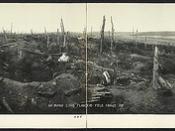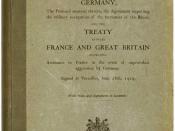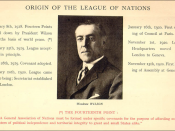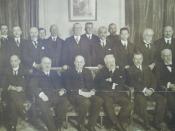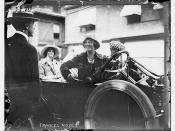Sub-questions
(Give explanations for the original concept of the League and it's members.
Name countries that were not permitted to join and the reasons why.
Pinpoint other factors that contributed to the failure of the group by naming one or two cases which they did not acknowledge correctly.)
The League of Nations was an international police force, which was originally part of Woodrow Wilson's "14 points". It had four main parts all of which relate in someway to encourage peace, trade and to some extent co-operation between countries. Therefore all of the aims and laws that were stated are all derived from the perspective international cooperation.
The league wanted to discourage aggression and the anger present between countries to prevent another war from taking place in the future. To reinforce this fact even more, disarmament was highly supported; if countries did not have any weapons or means of artillery they would not be able to fight at all or, if possible, only for a short period of time.
Another intention of the League of Nations was to improve working conditions for the employees. This would not only benefit the workers but also the government, healthy workers would be able to produce high quality goods, it would also deal with the issue of poverty to some measure.
The League of Nations started with 42 members of whom two were the main leaders and the rest just followers of the set of rules, because they either believed in peace or they were to be rewarded as part of the treaty of Versailles.
One of the major set backs was the interest, or the lack thereof, in how the league was to succeed with Britain and France as ring leaders. After WW1, some countries would not and did not agree with the decisions made by the allies and held a "grudge" to the happenings of the past few years.
The other key fact was that the USA did not want to join in the international police force, which on paper was Wilson's own idea. The first and foremost reason in this was USA's dislike of colonies. They did not agree with the idea of more powerful countries having a say in the ruling of others. More to the point, Wilson did not want to support the colonies of other countries due his strong perspective of the merits of freedom.
The idea of joining the League was unpopular among the American citizens also; the German immigrants in the USA hated the unfair treaty that dealt severely with their homeland. There would have been a substantial economical cost involved in solving problems all over the world, and an army of soldiers would also be needed to fight wars with countries that refused to abide by the statements of the League.
Germany was not allowed to join until it proved itself as a peace wanting country, in the opinion of mainly Britain and France.
Russia was also prohibited to unite because of the communist government. Even thought the agreement and presence of Russia did not make much difference to the league, it did still remain as a possible threat; a large country with the "potential" to become a powerful nation was not allowed to join an international League.
The league failed on the account of a number of reasons. The Treaty of Versailles played an important part in this. The strong minded opinion of Britain and France against the peace wanting Wilson clashed immediately and caused disagreements before the treaty was even made. This in itself was a very bad start made even worse as Clemenceau and Lloyd George decided to reward their allies by assigning them colonies and other such gifts. Therefore, USA, the most powerful nation in the world failed to join the League as it did not agree with the slow and limited action the other members were under taking and other economical and military related facts also contributed to the inefficiency of the whole idea.
Russia was not allowed to join in because of the communist government, and Germany was prohibited from joining due to the fact that they beared the war guilt and were to the viewpoint of others, untrustworthy.
Weak, slow and disorganised actions made by the league to deal with disputes that occurred after the formation of the force, was one of the main reasons that it failed. International arguments and disagreements became worse as time progressed, and some countries did not wait until a decision was made by the League members and took military action instead; this complicated matters even more.
In the Manchuria case the year took a whole year to come to some sort of resolution, and even then they failed to collectively agree on the action that it should take. By which time of course, Japan had turned to their army for trust, went through an early 1930's depression stage, planned an explosion on the South Manchurian railway, blamed the local Chinese people for killing their men, invaded Manchuria and fought a full-scale war to obtain colonies out side of Japan. The league attempted to order Japan out of Manchuria but this only resulted in Japan quitting. Yet again the league was left wounded as it lost it's most influential member in Far East Asia.
The league had no army to support its decisions and this meant that it did not have military force to oppose Italy invading Abyssinia. The lack of an army not only left them vulnerable to the aforementioned dispute but also at risk from disagreements from any country especially aggressor nations such as Germany, Japan and Italy.
To say that the most important reason why the League was weak in the 1920s was its lack of army would not be entirely true. The ineffective decision making, a reputation for slow resolutions combined with many other faults, as well as the lack of an army all contribute to the failure of the League of Nations.
